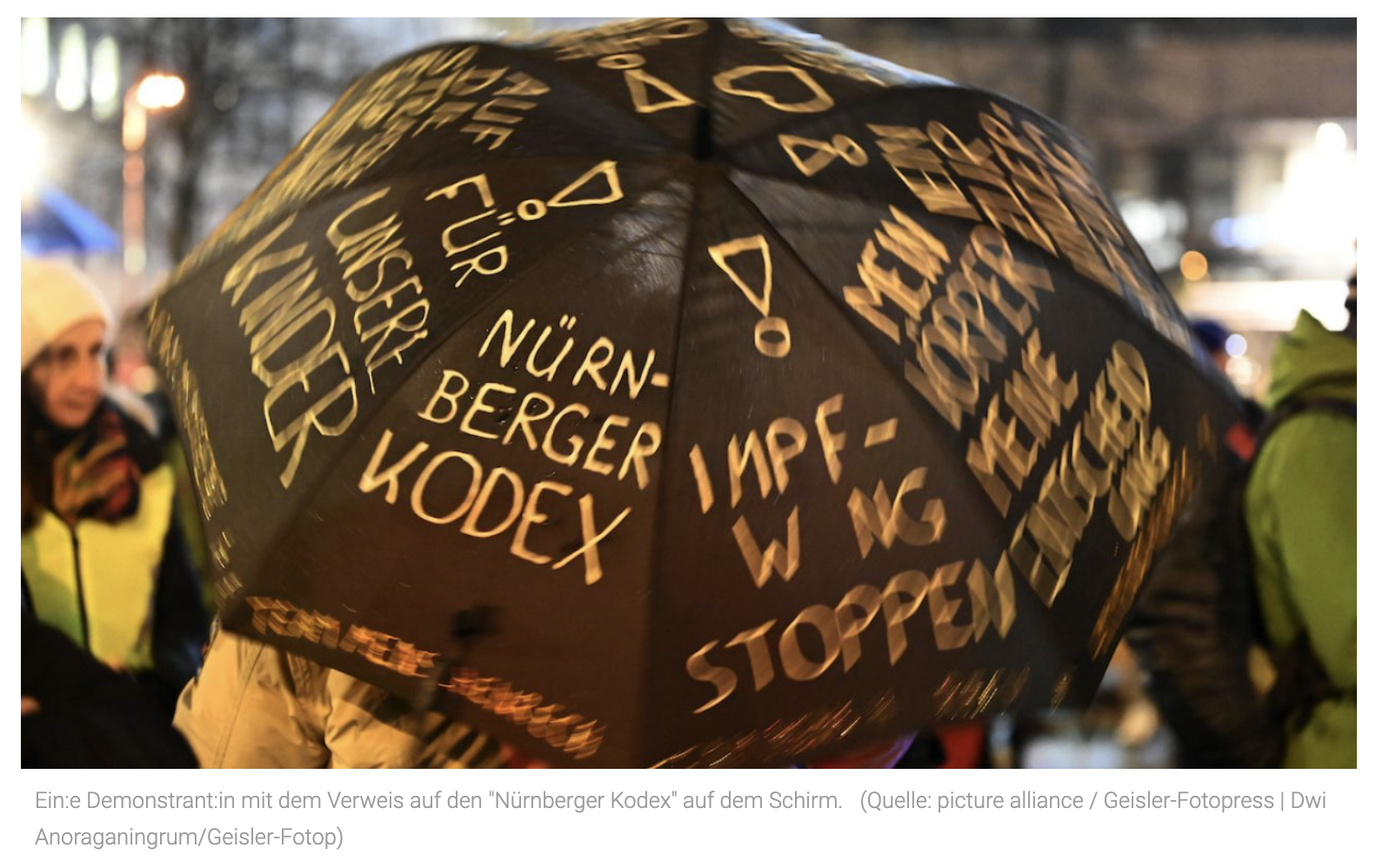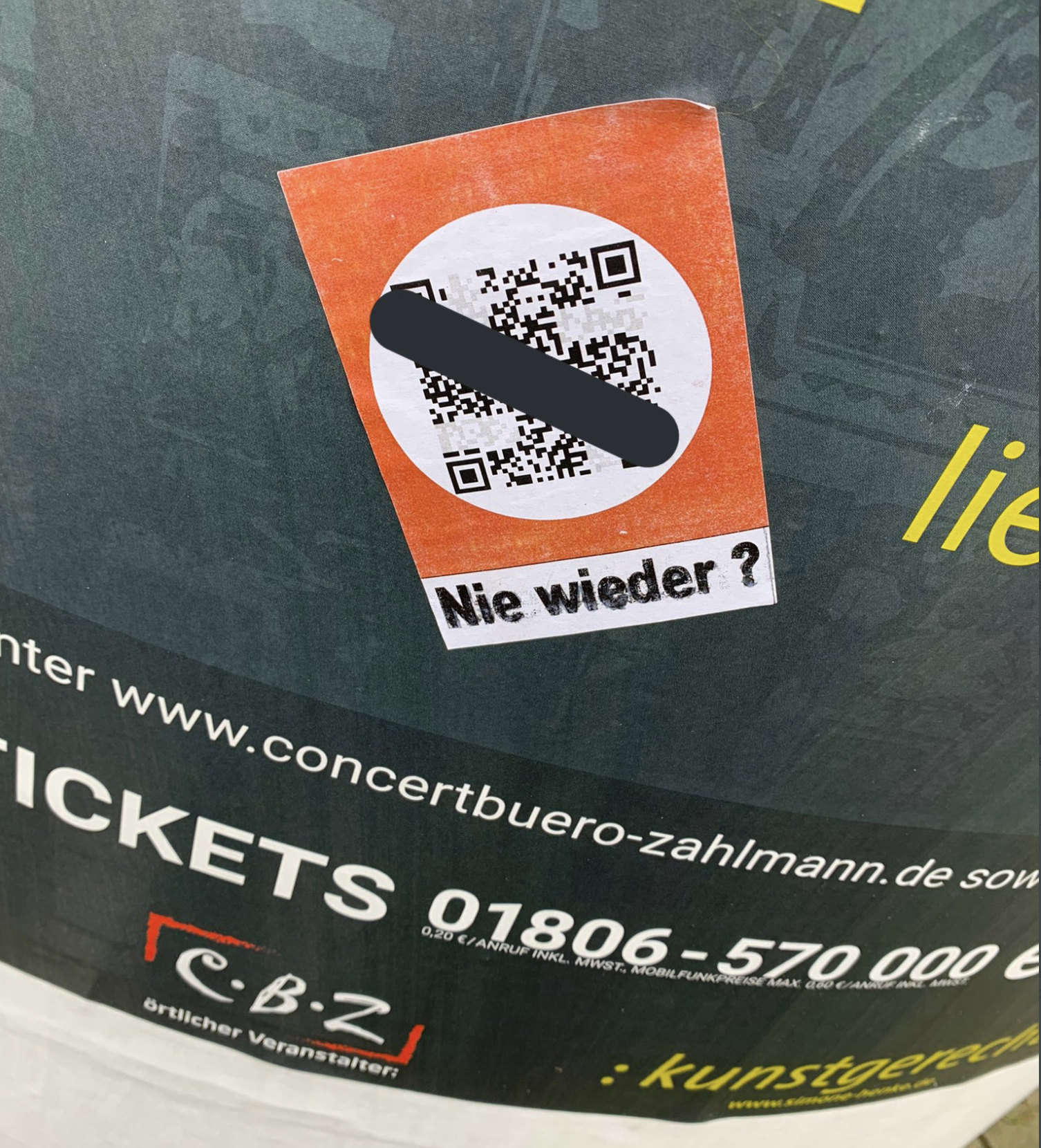Nazi relativisation: What is the story behind Nuremberg 2.0 and the Nuremberg Code?
By Erika Balzer, originally published in German on Belltower News
Coronavirus deniers and opponents to the vaccine claim that politicians are violating the Nuremberg Code through the introduction of vaccines and measures to curtail the pandemic. They are now calling for a “Nuremberg 2.0”. What do they mean by this and how are they trivialising Nazi crimes in the process?
Time and again, opponents to the COVID-19 vaccine seize the opportunity at demonstrations and on social media channels to compare themselves with groups prosecuted during the era of National Socialism, including Jews, Sinti, Roma, disabled persons, homosexuals and political opponents. They contend that they are suffering the same fate as millions of people under the rule of the Nazis. When it comes to the pandemic, antisemitic incidents and behaviour that trivialises the Holocaust are nothing new. According to the German Federal Ministry of the Interior, in 2021 the number of antisemitic crimes increased by 30 percent compared to the previous year – from 2,351 incidents to 3,028. This constitutes a record high. Common ways to relativise the Holocaust include wearing ‘unvaccinated’ stars on the arm, making comparisons to Sophie Scholl and Anne Frank, and calling for a “Nuremberg 2.0”, or a repeat of the Nuremberg trials after World War II, during which the main perpetrators of Nazi crimes were held responsible for their actions. Sitting in the dock today, however, are virologists, scientists, “vaccine lobbyists” and politicians.
Imanuel Baumann, the head of the Memorium Nuremberg Trials, spoke to Belltower.News in no uncertain terms: “If you put the Shoah side by side with policies implemented during the pandemic, you are trivialising the crimes of the Nazi regime.” Calling for a “Nuremberg 2.0” is part of this. As a historian, Baumann specialises in 18th and 19th-century criminal policy and history, and in the past has worked at the Buchenwald Memorial and the Mittelbau-Dora Concentration Camp Memorial. He has been head of the Memorium Nuremberg Trials – located at the original site of the Palace of Justice, Nuremberg – since April 2021. Here, guests are informed about the proceedings that occurred before the International Court of Justice and the subsequent trials that took place.
The Nuremberg trials
Following Germany’s capitulation at the end of World War II, Hall 600 in the Palace of Justice saw 24 men who were primarily responsible for the crimes of the Nazi state stand before the International Military Tribunal in the so-called “Trial of the Major War Criminals”. The judges: France, the UK, the USA and the USSR. The four potential charges levied against the men were as follows: crimes against peace, crimes against humanity, war crimes, and a common plan or conspiracy to commit such crimes.
In responding to demands by opponents to the vaccine to have a second set of Nuremberg trials, Baumann states: “The Nuremberg trials constituted the first occasion where legitimate trials could be held against the main perpetrators of the Second World War. By contrast, people who today call for a “Nuremberg 2.0” are demanding revenge, not fair legal proceedings for those responsible. This is the exact opposite of the Nuremberg trials, which were about seeking justice rather than revenge – and this despite the perpetrators involved.”
The defendants at the first trials included Hermann Göring, Commander of the Luftwaffe under National Socialism, Deputy Führer Rudolf Hess, Julius Streicher (publisher of the antisemitic newspaper Der Stürmer) and other prominent military, political and economic leaders of Nazi Germany, not least the remnants of the Nazi cabinet, the heads of the Nazi Party, the SS and the Gestapo, and the general staff and high command of the Wehrmacht. The trials began on 20 November 1945 and the sentences were passed on 30 September and 1 October 1946. Twelve defendants were sentenced to death, three received lifelong imprisonment, four received long-term prison sentences, and three were acquitted.
The subsequent Nuremberg trials
Between 1946 and 1949, twelve trials took place during which 185 physicians, jurists, soldiers, civil servants and police officers were sentenced by US military courts. The first such trial was held from December 1946 to August 1947. Known as the “Doctors’ Trial”, 23 physicians and SS officials were held to account for the brutal experiments they conducted on adults and children and the horrific murders for which they were responsible. Hundreds of thousands of people were forcibly sterilised during the Nazi era or else murdered in hospitals or concentration camps after being declared “unworthy of life” due to illness or disability.
The Nuremberg Code, a set of research ethics, was created to ensure that such savage experiments and murders would never again be carried out “in the name of science”: “The Nuremberg Code states that voluntary and informed consent is required for clinical studies. Human beings may not be forced into taking part in studies or experiments through violence or unlawful measures. Binding standards were agreed on that still have to be complied with in studies today,” explains Baumann. Ten guiding principles were formulated to govern human experiments and provide an ethical framework for areas such as genetic engineering, transplants and terminal care.
Opponents to the vaccine and measures to curtail the pandemic believe these principles have been violated. They accuse the authorities of using pressure tactics and discriminating against people in the form of the vaccinated/recovered (“2G”) or vaccinated/recovered/tested (“3G”) rule, with the vaccines themselves constituting inhumane experiments. They see vaccinated persons as human guinea pigs, believing the vaccines contain poison. The aim? To bring about a genocide.
Baumann’s response: “Human beings have voluntarily chosen to take part in studies and receive a vaccine during various trial phases. Vaccines are clinically tested in compliance with the Nuremberg Code, which is why claims of infringement are simply unfounded.”
Calls for a tribunal predate the pandemic
This narrative has been around since long before the pandemic: for years now, the far-right and anti-Muslim activists have been demanding a “Nuremberg 2.0”. Back then, they accused politicians of trivialising the “Islamification of Germany” and standing idly by as the country’s ethnicity was being turned on its head. A website with the name “Nuremberg 2.0” has been around since at least 2011, though in 2020 it was indexed by the Federal Department for Media Harmful to Young Persons.
Now, however, these calls are experiencing a revival. One example is on stickers, in Telegram posts and in legal challenges – as instigated by Reiner Fuellmich, for example. Fuellmich was the candidate for the German chancellorship for the “Querdenker” movement party “Die Basis” and works as a lawyer in Germany and California. Since the start of the pandemic, he has been seeking to set up an “international corona tribunal” for those responsible for the pandemic measures as well as a new “Nuremberg trial” for producers of PCR tests. His sights are set on virologist Christian Drosten, president of the Robert Koch Institute Lothar Wieler, and politicians who have followed the advice of scientists.
Fuellmich exists within a bubble of conspiracy ideologies, refers to the “Great Reset” and believes the media and state propaganda are full of lies. Together with the lawyer Viviane Fischer, he founded the “Corona Panel”, through which he aims to bring to trial those responsible for the measures to mitigate the pandemic. According to an investigation by the “anti-fake news” blog volksverpetzer, Fuellmich has already filed multiple suits in Canada and the USA that deal with the reliability of PCR tests. All claims have been unsuccessful so far. The next class action lawsuit is currently being prepared by the “Corona Panel”.
Followers in various Telegram groups are already celebrating, and believe the next lawsuit will “not be a Nuremberg 2.0, but evidence is being gathered for a possible tribunal that could end up being – and hopefully will be – much bigger than the 1945 Nuremberg Trials”. These are the words taken from a channel with more than 25,000 subscribers.
The protests against the coronavirus measures and vaccines have only helped to normalise sentiments that trivialise Nazi crimes. Baumann offers some words of warning: “This isn’t purely the realm of the far right. Thoughts like these are being expressed by people far and wide across all corners of society. They see themselves as victims and, in doing so, are trivialising the Shoah,” he concludes.




